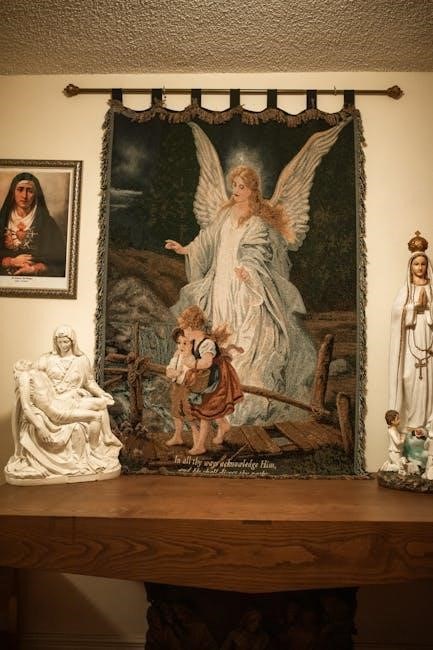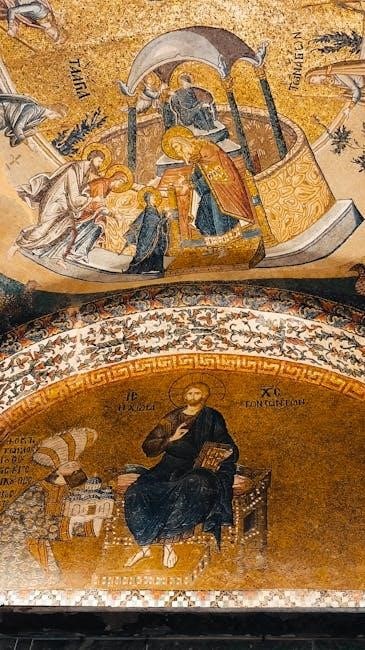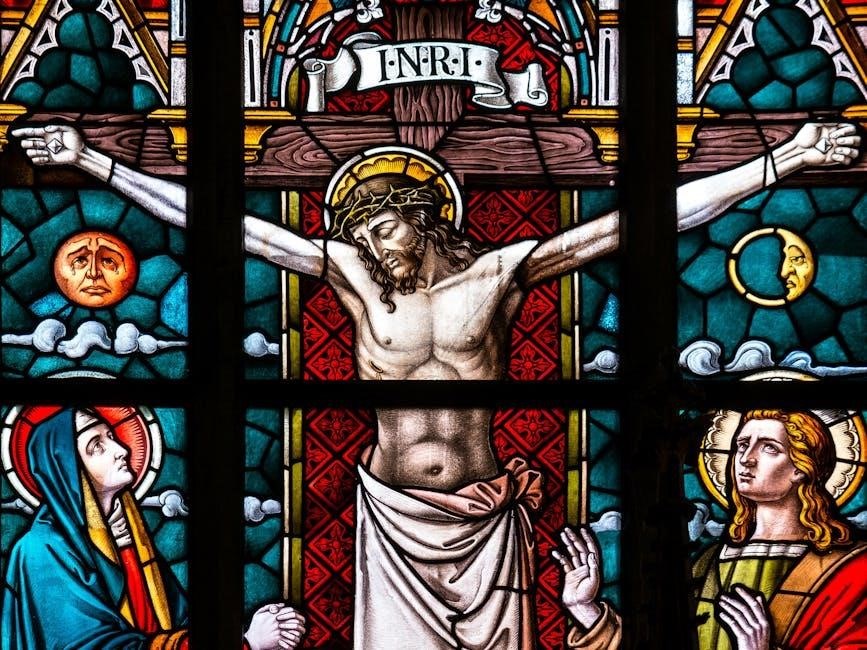
el niño jesús no odia a los mariquitas gratis pdf
This controversial satirical coloring book, authored by Don Julio, addresses homophobia through provocative humor and vibrant illustrations, sparking debates on LGBTQ+ rights and free expression globally.
Overview of the Book’s Title and Theme
The title El Niño Jesús No Odia a los Mariquitas translates to “Baby Jesus Doesn’t Hate Gays,” a provocative statement that immediately challenges stereotypes. The book, authored by Don Julio, uses satire to address homophobia and societal prejudices through humor and vibrant, adult-oriented illustrations. Its theme revolves around normalizing conversations about homosexuality and critiquing oppressive attitudes, blending religious and LGBTQ+ narratives. The design mimics a children’s coloring book, adding a layer of irony to its bold commentary. This unique approach sparks reflection on the intersection of faith, identity, and acceptance, making it a polarizing yet thought-provoking work.

Relevance of the Book in Modern Discussions on Homophobia
El Niño Jesús No Odia a los Mariquitas is a timely and incisive commentary on contemporary homophobia, using satire to provoke dialogue. By blending humor with sharp critique, it challenges the normalization of homophobic attitudes in society, particularly within religious contexts. The book’s approach to addressing LGBTQ+ issues through a coloring book format makes it accessible and engaging, sparking necessary conversations about acceptance and equality. Its relevance lies in its ability to confront taboo subjects head-on, encouraging readers to question their beliefs and fostering empathy. This work is a powerful tool in modern discussions, emphasizing the importance of open dialogue and the need to challenge outdated, harmful ideologies surrounding sexuality and identity.

Key Features of the Book
El Niño Jesús No Odia a los Mariquitas is a satirical coloring book blending humor with social commentary, designed for adults, featuring vibrant illustrations that critique homophobia.
Target Audience and Age Recommendations
El Niño Jesús No Odia a los Mariquitas is primarily aimed at adult readers due to its satirical and mature themes. Despite its childlike design, the content addresses complex societal issues, making it inappropriate for younger audiences. The book’s publisher, Fandogamia, has clarified that it is not intended for children, despite its initial appearance as a coloring book. The recommended age is 18 and above, as it contains explicit humor and commentary on sensitive topics like homophobia and sexuality. This distinction is crucial, as the book’s format may lead to misunderstandings about its intended audience. Its unique blend of satire and social critique appeals to adults seeking thought-provoking content. The ISBN-registered book, with 24 pages, has sparked debates about its suitability for different age groups, further emphasizing its adult-oriented nature.

Unique Blend of Satire and Social Commentary
El Niño Jesús No Odia a los Mariquitas masterfully combines satire with sharp social commentary, using humor to critique homophobia and societal norms. Through its vibrant, childlike illustrations and irreverent text, the book challenges readers to confront uncomfortable truths about prejudice and discrimination. Don Julio’s approach is both provocative and insightful, making the book a powerful tool for sparking conversations about LGBTQ+ rights. The satirical elements are balanced with a clear message of acceptance, creating a work that is both entertaining and thought-provoking. This blend of humor and commentary has made the book a focal point in discussions about the role of satire in addressing social issues, further solidifying its cultural relevance and impact. The book’s unique style ensures it resonates with a wide audience, encouraging reflection and dialogue.
Design and Layout: A Coloring Book for Adults
El Niño Jesús No Odia a los Mariquitas is cleverly designed as a satirical coloring book for adults, blending vibrant, childlike illustrations with mature themes. Its playful layout, complete with coloring pages, contrasts sharply with its provocative content, creating a striking visual experience. The book’s design intentionally subverts traditional notions of coloring books, typically associated with children, to highlight its edgy subject matter. This unique approach not only grabs attention but also challenges readers to engage with the material on a deeper level. The combination of whimsical visuals and sharp commentary makes it a standout piece in adult literature, offering both entertainment and intellectual stimulation. Its design plays a crucial role in delivering its message effectively, setting it apart from more conventional formats.

Controversy Surrounding the Publication
El Niño Jesús No Odia a los Mariquitas sparked intense backlash due to its provocative content, blending religious imagery with explicit themes, leading to public outrage and censorship attempts.
Public Reaction and Media Coverage
The release of El Niño Jesús No Odia a los Mariquitas ignited a firestorm of public debate, with many praising its bold satire while others condemned its controversial content. The book, marketed as a coloring activity for adults, quickly went viral on social media platforms, sparking heated discussions about its intended message and appropriateness. Media outlets worldwide covered the story, highlighting the book’s blend of religious imagery and explicit themes, which some deemed blasphemous or offensive. Critics argued that the content was unsuitable for children, despite the publisher’s clarification that it was intended for adult audiences. The polarized reactions underscored the book’s ability to challenge societal norms and provoke conversation about homophobia and free expression.
Legal Battles and Censorship Attempts
The book El Niño Jesús No Odia a los Mariquitas faced significant legal challenges and censorship attempts due to its controversial content. Critics accused the publication of containing explicit material inappropriate for children, leading to calls for its removal from retail platforms. The publisher, Fandogamia, defended the work, arguing it was intended for adult audiences as a satirical critique of homophobia. A court case was filed, but it was later dismissed after the publisher provided evidence that the book was not marketed to minors. Despite this, some retailers initially pulled the book from shelves, sparking debates about censorship and artistic freedom. The backlash highlighted the polarizing nature of the book’s themes and its ability to provoke societal discourse on sensitive issues.

Cultural Impact and Relevance
This satirical book addresses homophobia through humor, prompting discussions on LGBTQ+ rights and inclusivity, serving as a significant cultural commentary on modern societal issues and sparking dialogue.
The Role of Satire in Addressing Homophobia
El Niño Jesús No Odia a los Mariquitas employs biting satire to confront homophobia, using humor and irony to highlight societal hypocrisies. By presenting controversial themes in a seemingly innocent format, the book challenges readers to question their biases. Satire serves as a powerful tool, making uncomfortable truths more digestible while sparking necessary conversations. The approach not only critiques homophobia but also encourages empathy and understanding. This method is particularly effective in reaching audiences who might otherwise avoid direct discussions on LGBTQ+ issues. Through its provocative yet thought-provoking style, the book underscores the importance of satire in dismantling prejudice and fostering a more inclusive society.
Importance of Open Conversations About LGBTQ+ Rights

El Niño Jesús No Odia a los Mariquitas emphasizes the urgency of fostering open dialogue about LGBTQ+ rights. By addressing homophobia through satire, the book encourages readers to engage in honest discussions about acceptance and equality. Open conversations help dismantle stereotypes and promote understanding, which are crucial for advancing LGBTQ+ rights. The book’s approach challenges societal norms, urging individuals to reflect on their attitudes toward the LGBTQ+ community. Such discussions are vital for creating a more inclusive and empathetic society, where diversity is celebrated and discrimination is actively combated. The book serves as a catalyst for these essential conversations, highlighting the importance of dialogue in driving social change and fostering mutual respect.

Availability and Distribution
The book is available as a free PDF download and can be purchased in physical form through various online and brick-and-mortar retailers globally.
Where to Find the PDF Version for Free

The PDF version of “El Niño Jesús No Odia a los Mariquitas” can be freely downloaded from various online platforms and file-sharing sites. Websites like PDF sharing platforms and online libraries offer this satirical coloring book for free. Additionally, social media groups and forums dedicated to LGBTQ+ topics often provide direct links to the PDF. Readers can also find it through search engines by querying the book’s title along with keywords like “free PDF” or “download.” However, it’s essential to ensure that the source is reliable to avoid downloading malicious files. The book’s availability online has made it accessible to a wide audience, contributing to its viral spread and public discourse.
Physical Copies and Retail Options
Physical copies of “El Niño Jesús No Odia a los Mariquitas” are available for purchase through various retailers. The book can be found in select bookstores specializing in LGBTQ+ literature and satire. Online platforms like Amazon and eBay also offer the paperback version, often with shipping options worldwide. Additionally, the publisher, Fandogamia, sells physical copies directly through their official website, ensuring authenticity and supporting the creator. Some independent bookstores and specialty shops focused on progressive or artistic content may carry the book as well. For those preferring in-person purchases, local retailers in urban areas with diverse selections are worth checking. The physical edition maintains its provocative design, making it a unique addition to personal libraries or gifts for those interested in satirical commentary on societal issues.
This bold, satirical book challenges homophobia through art and humor, sparking essential conversations about LGBTQ+ rights and acceptance in today’s society.
Final Thoughts on the Book’s Message
“El Niño Jesús No Odia a los Mariquitas Gratis PDF” delivers a powerful message about love, acceptance, and the rejection of prejudice. By blending satire with religious and cultural imagery, the book challenges readers to confront homophobia and embrace diversity. Its provocative approach sparks necessary conversations about LGBTQ+ rights and the importance of open dialogue. While controversial, the book serves as a catalyst for change, encouraging readers to question societal norms and promote inclusivity. Ultimately, it reminds us that love and understanding should transcend judgment and hate. This bold statement is both a call to action and a reflection of the ongoing struggle for equality in modern society.
Potential for Future Discussions and Reforms
“El Niño Jesús No Odia a los Mariquitas Gratis PDF” opens doors for future discussions on LGBTQ+ rights and social reforms. Its satirical approach not only highlights the absurdity of homophobia but also encourages a broader dialogue about inclusivity and acceptance. By challenging traditional narratives, the book has the potential to inspire legislative changes and cultural shifts. It serves as a reminder that art and satire can be powerful tools for driving social progress. Future reforms may include greater representation of LGBTQ+ voices in media and education, as well as policies that protect against discrimination. The book’s impact underscores the importance of continuous advocacy and open conversations in fostering a more equitable society.